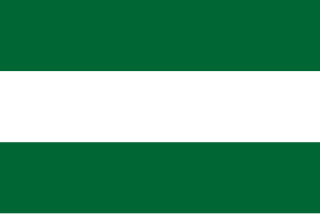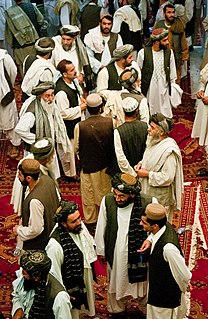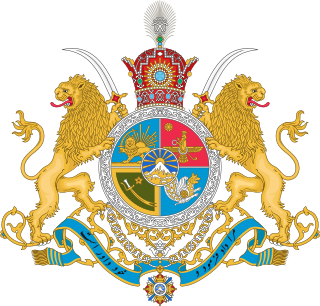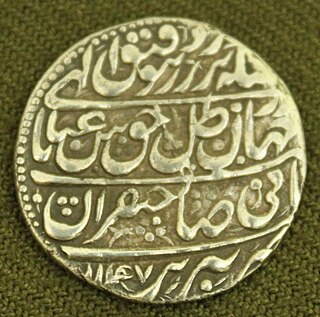
The Durrani Empire, also called the Sadozai Kingdom and the Afghan Empire, was an Afghan empire founded and built by Ahmad Shah Abdali in parts of Central Asia, the Middle East and South Asia. At its maximum extent, the empire ruled over the modern-day countries of Afghanistan and Pakistan, as well as parts of northeastern and southeastern Iran, eastern Turkmenistan, and northwestern India. Next to the Ottoman Empire, the Durrani Empire was the greatest Muslim empire of the second half of the eighteenth century.

Pashtuns, historically known as Afghans, are the largest Iranian ethnic group native to Central and South Asia. The ethnic group's native language is Pashto, an Eastern Iranian language. Additionally, ethnic Pashtuns in Afghanistan speak the Dari dialect of Persian as a second language, while those in the Indian subcontinent use Hindi-Urdu as a second language. However, a significant minority speaks Persian or Hindi-Urdu as their first language. The total number of Pashtuns is estimated to be around 63 million; however, this figure is disputed, because of the lack of an official census in Afghanistan since 1979.
Iranian Georgians or Persian Georgians are Iranian citizens who are ethnically Georgian, and are an ethnic group living in Iran. Today's Georgia was a subject to Iran in the ancient times under the Achaemenid and Sassanian empires and from the 16th century till the early 19th century, starting with the Safavids in power and later Qajars. Shah Abbas I, his predecessors, and successors, relocated by force hundreds of thousands of Christian, and Jewish Georgians as part of his programs to reduce the power of the Qizilbash, develop industrial economy, strengthen the military, and populate newly built towns in various places in Iran including the provinces of Isfahan, Mazandaran and Khuzestan. A certain number of these, among them members of the nobility, also migrated voluntarily over the centuries, as well as some that moved as muhajirs in the 19th century to Iran, following the Russian conquest of the Caucasus. The Georgian community of Fereydunshahr have retained their distinct Georgian identity to this day, despite having been obliged to adopt certain aspects of Iranian culture such as the Persian language and Twelver Shia Islam.

Reza Shah Pahlavi was a military brigadier general, minister of war, prime minister, first Shah of the House of Pahlavi of the Imperial State of Iran. He reigned from 15 December 1925 until he was forced to abdicate by the Anglo-Soviet invasion of Iran on 16 September 1941. Reza Shah introduced many social, economic, and political reforms during his reign, ultimately laying the foundation of the modern Iranian state. Therefore, he is regarded as the founder of modern Iran.

The Pahlavi dynasty was the last Iranian royal dynasty, ruling for almost 54 years between 1925 and 1979. Although the dynasty was founded from a non-aristocratic Mazanderani family in modern times, they named themselves after the Pahlavi language spoken in the pre-Islamic Sasanian Empire in order to strengthen their nationalist credentials.

Mashhad, also spelled Mashad or Meshed, is the second-most-populous city in Iran and the capital of Razavi Khorasan Province. It is located in the northeast of the country. It has a population of 3,001,184, which includes the areas of Mashhad Taman and Torqabeh. It was a major oasis along the ancient Silk Road connecting with Merv to the east.

Agha Mohammad Khan Qajar, also known by his regnal name of Agha Mohammad Shah, was the founder of the Qajar dynasty of Iran, ruling from 1789 to 1797 as king (shah). Originally chieftain of the Qoyunlu branch of the Qajar tribe, Agha Mohammad Khan was enthroned as the king of Iran in 1789, but was not officially crowned until March 1796, having deposed Lotf Ali Khan of the Zand dynasty in 1794. Agha Mohammad Khan Qajar was famously the eunuch Monarch, being castrated as a young adult upon his capture by Adel Shah Afshar, and hence was childless. He was assassinated on 17 June 1797, and was succeeded by his nephew, Fath-Ali Shah Qajar.

Zahedan is a city and capital of Sistan and Baluchestan Province, Iran. At the 2016 census, its population was 587,730.
Amanullah or Amanallah is a male Muslim given name meaning the trust or protection of God. It may refer to:

Shahrokh Mirza, better known by his dynastic title of Shahrokh Shah was the Afsharid king (shah) of the western part of Khorasan from 1750 to 1796, with a two-month interruption.

The Afsharid dynasty was an Iranian dynasty that originated from the Turkoman Afshar tribe in Iran's north-eastern province of Khorasan, ruling Iran (Persia) in the mid-eighteenth century. The dynasty was founded in 1736 by the brilliant military commander Nader Shah, who deposed the last member of the Safavid dynasty and proclaimed himself as the Shah of Iran.
Reza is a Persian name, originating from the Arabic word رضا, Riḍā, which literally means "the fact of being pleased or contented; contentment, approval". In religious context, this name is interpreted as satisfaction or "perfect contentment with God's will or decree". The name is neutral and not one used only by a particular sect, and is used widely by Iranians, Arab Christians and Arab Druze. According to Annemarie Schimmel, "riḍā is closely related to shukr"; "shukr" is an Arabic term denoting thankfulness and gratitude.

Abbas III reigned 1732–1736; was a son of Shah Tahmasp II and Shahpari Begum of the Safavid dynasty. After the deposition of his father by Nader Khan the infant Abbas was appointed nominal ruler of Iran on 7 September 1732. Nader Khan, who was the real ruler of the country, assumed the positions of deputy of state and viceroy. Abbas III was deposed in March 1736, when Nader Khan had himself crowned as Nader Shah. This marked the official end of the Safavid dynasty. Abbas was sent to join his father in prison in Sabzevar, Khorasan.
Soraya is a feminine Persian name. It is derived from the Arabic name for the Pleiades star cluster, Thurayya. The name is also popular in Europe due to its association with Soraya Esfandiary-Bakhtiari, the second wife of Shah Mohammad Reza Pahlavi of Iran, who became a European socialite.
Inayatullah, also spelled Enayat Ollah etc. is a male Muslim given name and surname composed of the elements Inayat, meaning care and Allah, meaning of God. It may refer to:

Mohammad Reza Pahlavi, also known as Mohammad Reza Shah, was the last Shah (King) of the Imperial State of Iran from 16 September 1941 until his overthrow in the Iranian Revolution on 11 February 1979. Due to his status as the last Shah of Iran, he is often known as simply the Shah.

Nader Shah Afshar was the founder of the Afsharid dynasty of Iran and one of the most powerful Iranian rulers in Iranian history, ruling as Shah of Iran (Persia) from 1736 to 1747, when he was assassinated during a rebellion. Because of his military genius, as evidenced in his numerous campaigns throughout the Middle East, the Caucasus, Central and South Asia, such as the battles of Herat, Mihmandust, Murche-Khort, Kirkuk, Yeghevard, Khyber Pass, Karnal and Kars, some historians have described him as the Napoleon of Persia, the Sword of Persia, or the Second Alexander. Nader belonged to the Turkoman Afshar tribe, a semi-nomadic tribe settled in Khorasan in northeastern Iran, which had supplied military power to the Safavid dynasty since the time of Shah Ismail I.
Rezaie is an Iranian word meaning "of Reza". It is never referred to as Rezaei as it is grammatically incorrect. It is used as a surname and a place name, it may refer to:

Pahlavi Iran, officially the Imperial State of Iran, known as the Imperial State of Persia from 1925 to 1935, was a country in Western Asia. It was bordered by Turkey and Iraq to the west, the Soviet Union to the north, Afghanistan and Pakistan to the east and shared a maritime border with Oman toward the south. With a population of 37 million in 1979, Tehran served as its capital city.












